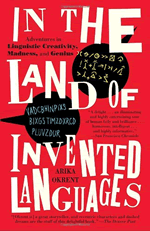Last week I read Arika Okrent’s book In the Land of Invented Languages: Adventures in Linguistic Creativity, Madness, and Genius, which I found very interesting.
The book covers the history of language invention from Hildegard of Bingen’s Lingua Ignota; through philosophical languages like the one John Wilkins devised; International Auxiliary languages like Esperanto and Volapük; logical languages like Loglan and Lojban; to fictional languages like Quenya, Sindarin and Klingon. The author tells the stories behind these languages and the people who invented them, meets some of the inventors who are still around, learns some of the languages, and goes to meet ups for some of them.
One thing that struck me was the fact that many language inventors, especially those of philosophical, universal, logical and international auxiliary languages, believed that it was possible to make perfect, unambiguous and/or totally regular languages, and that natural languages were flawed because they contain irregularities, ambiguity and unnecessary complexities. Okrent argues that these are features, not flaws, and they give languages flexibility. I would add to this that the built in redundancy in languages helps ensure that messages get across even if some of the content is lost due to noisy conditions, unclear pronunciation of the speaker, inattention of the listener, or other factors.

I agree with Okrent.
Often, these “features” vary among relative languages from a common feature which was more or less “regular” somewhat. This is what I believe.
Aside from supposed efficiency of communication, I wonder what the implications of an entirely logical, unambiguous, redundancy-free language are for creative writing (poetry, prose, plays, novels, songwriting etc.). Perhaps, without the multiplicity of words to choose from for their sonoric qualities, the flexibility of syntax, the possibility of multiple meanings etc., there would have been no Shakespeare, no Homer, no Norse sagas, no Mabinogion, no Mahabharata… no Bible;-)
I had a similar reaction upon reading about the goal of Ithkuil. (So much so that I wrote about it on my blog: http://mjroy.blogspot.com/2012/12/ithkuil-and-ambiguity.html) I also think that the end game of a hyper-logical language would need to completely remove all other messy features of human communication, like gestures, proxemics, body language, and other factors. Context is too rife with multivalencies and the human factor would have to go. 🙁